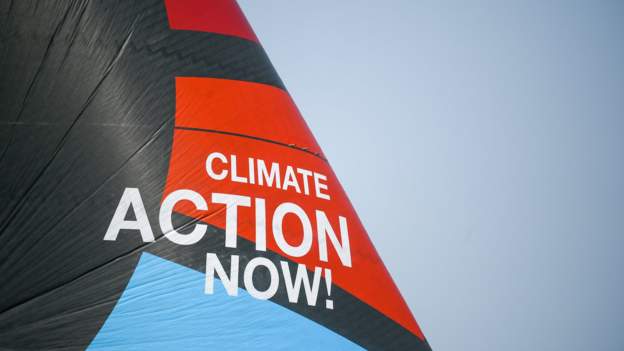The British sailor, Will Harris, is a part of Team Malizia that is proudly carrying ‘Climate Action Now!’ on its sail as it competes in The Ocean Race.
During the race, Harris found himself leaping over the side of the boat with a knife, akin to a pirate. Fishing nets, ropes, and debris had gotten entangled around the hydrofoils.
Harris is representing Team Malizia in The Ocean Race, a challenging global event that wraps up this week in Genoa, Italy, after six grueling months of a 60,000km journey around the world.
Participating teams are merging their efforts in navigating one of the world’s most challenging professional sports events with contributing to climate impact research.
Their boats are serving as platforms for collecting data on plastic pollution, the rise in ocean temperatures, and the levels of carbon dioxide and salt in the seas.
According to Harris, “The garbage that we’re finding has been in the ocean for 40 or 50 years. It consists of a mix of rope, plastic, which isn’t decomposing, and marine life that has tried to inhabit it.
He adds, “Think of the state it will be in 300 years from now. The idea is quite scary and enlightening.”
Plastic pollution in the ocean is growing, with some regions reporting a 20% increase since the last race in 2018.
Harris and the five teams competing have experienced first-hand the escalating environmental impacts on our oceans.
“In the Caribbean, I’ve noticed sargassum seaweed clogging up the water,” Harris recounts. “We’re also seeing diminishing wildlife, particularly birds, and the storms we face at sea are intensifying.
“It’s striking that within the few years I’ve been participating in this race, changes are already noticeable. And generally, they’re not positive.”
Global warming is contributing to rising ocean temperatures, with record-breaking highs already recorded this year.
The North Atlantic Ocean around the UK, a particularly concerning area, has experienced some of the most severe marine heatwaves globally.
With oceans and seas covering 70% of the world’s surface and absorbing more than 90% of solar heat, the consequences of their warming are far-reaching.
Dr. Marilena Oltmanns, an expert in ocean and climate at the National Oceanography Centre, describes the rise in ocean temperatures as “unprecedented” and “very alarming” in an interview with the BBC.
Over the past decade, The Ocean Race’s route has extended by 30%, driven by an exclusion zone around Antarctica shifting 1,000 miles further north due to melting ice and iceberg risks.
“There’s an increasing number of stories about massive icebergs landing on South Georgia Island [in the South Atlantic Ocean] and threatening to destroy critical wildlife habitats,” adds Harris.
“As the ice exclusion zone expands, our race course is forced to lengthen because we have to navigate further around Antarctica.”
All boats participating in this 14th edition of the race are equipped with scientific monitoring devices. These collect data in some of the world’s most isolated ocean regions, which is then sent to scientists at the UK Oceanography Centre for analysis.
Even in the most remote areas of the world, the omnipresence of microplastics is apparent from the results.
Dr. Katsiaryna Pabortsava is analyzing the data from the boats at the National Oceanography Centre.
“Every sample we’ve analyzed so far contained microplastics. The samples from this year’s race show more microplastics compared to the last race in 2017-2018,” she says.
Dr. Pabortsava mentions that some samples contained “20 times more” microplastics, although the detection methods were “much more sensitive.”
Frequently Asked Questions (FAQs) about Ocean Race Climate Research
What is the role of the Ocean Race teams in climate impact research?
The Ocean Race teams, including Team Malizia with British sailor Will Harris, are involved in climate impact research. During the race, the boats collect information on plastic pollution, rising ocean temperatures, and the levels of carbon dioxide and salt in the seas.
How are ocean temperatures being affected by global warming?
Global warming is causing ocean temperatures to rise. The North Atlantic Ocean around the UK, in particular, has experienced some of the most severe marine heatwaves on Earth.
What has Will Harris reported about the environmental impacts on oceans?
Will Harris reported seeing an increase in sargassum seaweed clogging up the Caribbean and a decrease in wildlife, particularly birds. He also noted that the storms they face at sea are intensifying.
What have been the recent findings regarding plastic pollution in the oceans?
Plastic pollution in the ocean is growing, with some regions reporting a 20% increase since the last Ocean Race in 2018. Every sample analyzed from the current race has been found to contain microplastics.
How has The Ocean Race route been affected by climate change?
The Ocean Race route has extended by 30% over the past decade, driven by an exclusion zone around Antarctica shifting 1,000 miles further north due to melting ice and iceberg risks. As the ice exclusion zone expands, the race course is forced to lengthen because it has to navigate further around Antarctica.
More about Ocean Race Climate Research
- The Ocean Race
- National Oceanography Centre
- BBC News on Climate Change
- Microplastics in Oceans
- Effects of Global Warming on Ocean Temperature

5 comments
Man, this is a wake up call! Can’t believe the amt of plastic our oceans hv. it’s just sad…
Wow! Huge respect for these sailors. not only are they sailing around the globe, but they’re also doing critical research. way to go guys!!
As a sailor, this story really hits home. we need to do more to protect our oceans, peeps. We really do!!!
plastic for 40 or 50 years in the ocean?! Scary stuff… It’s time for some serious action on climate change. Thx for sharing this
So less wildlife, more plastic, and higher temps in the sea? Not lookin good at all. we gotta change, fast…